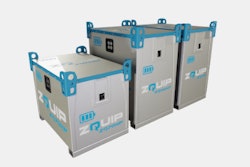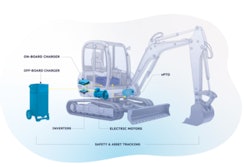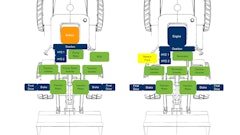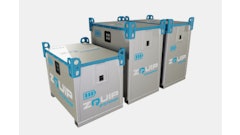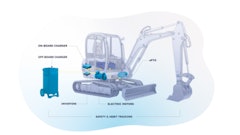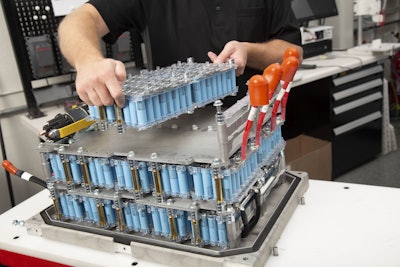
The advantages of electrification are clear: reduced emissions, improved efficiency and lower operating costs. But for off-highway applications, these benefits must go hand in hand with extreme durability and reliability. Unlike their on-road counterparts, off-highway machines operate in harsh environments, facing constant vibrations, extreme temperatures and heavy duty cycles. To take on these challenging environments, off-highway original equipment manufacturers (OEMs) need advanced battery technology engineered to withstand the elements. A crucial component of this technology is the battery management system (BMS): the brain of the battery that ensures safety, maximizes lifespan and enables peak performance even in the harshest conditions.
The Crucial Role of Battery Management Systems
With many battery chemistries available in today's market, lithium-ion stands out as a high-performing solution for rugged off-highway applications. These batteries are complex systems with intricate inner workings. To ensure they operate safely and efficiently, a sophisticated control system is essential, which is where the BMS comes in. Often overlooked, the BMS plays an important role in a battery's optimized performance, safety and overall lifespan by constantly monitoring and regulating every aspect of its operation.
Acting as a guardian of the battery pack, a well-designed BMS gauges the voltage and temperature of each cell module assembly (CMA) to ensure that its operating within the nominal safety range. It also acts as a data hub, sharing critical information about the battery's power, energy utilization, and overall state of health.
Beyond these primary functions, a BMS performs several other key roles to ensure optimal battery performance and safety:
- Thermal runaway protection — Integrating a smart BMS and current interruption devices significantly reduces the risk of thermal runaway in lithium-ion batteries.
- Diagnostics and optimization — A BMS can diagnose conditions within the battery pack much like a physician uses a patient's symptoms to diagnose and treat their illness. It can then make decisions to optimize a pack’s performance and maintain safe operation.
- Temperature management — The BMS measures the temperatures of cells throughout the pack to ensure that no cells are getting too hot.
- Charge and discharge control — The BMS constantly monitors and measures not only the temperature but also the charge and discharge currents and the voltages of each cell bank. These data points can help a BMS provide high-temperature shutdown capabilities and assist with smarter charging practices.
- Preventing overuse — A BMS is essential for controlling battery discharge and charge, ensuring that if the battery is overused or overheating, there are shut-offs in place to prevent a thermal runaway event.
For OEMs seeking a lithium-ion battery supplier, it’s important to partner with a manufacturer like Vanguard that adheres to stringent safety standards and has comprehensive protection systems in place to reduce safety and performance risks. Beyond safety, however, a well-designed BMS unlocks a wealth of capabilities that can optimize performance and enhance the user experience.
Unlocking Connectivity With Smart Batteries
What truly sets lithium-ion batteries apart is the connectivity unlocked by a BMS. Smart lithium-ion batteries can seamlessly integrate with various systems, including Internet of Things (IoT) devices, which opens a world of possibilities for data analysis and optimization. OEMs can leverage these insights from the BMS to get the full value out of their battery and find ways to optimize their machine’s performance.
This connectivity also enables the development of new value-added services for customers, further enhancing the overall value of equipment. Vanguard, for example, offers Bluetooth-enabled batteries that allow users to monitor battery status, temperature and state of charge directly from their smartphones. This real-time data access, which is becoming more in demand across the industry, empowers proactive maintenance and optimized performance, leading to greater efficiency and productivity for end users.
Optimizing Off-Highway Performance: The Power of BMS
Beyond enabling connectivity, advanced BMS technology offers significant advantages for OEMs and end users of off-highway equipment. By intelligently monitoring and managing the battery system in real time, a BMS can optimize performance, improve efficiency and enhance the overall user experience.
A sophisticated BMS can analyze data from various sources — including the battery, the vehicle and the environment — to optimize power delivery and energy usage. This can improve fuel efficiency, extend operating range and reduce downtime. Additionally, the data gathered by the BMS can be used to develop predictive maintenance programs that further minimize downtime and maximize the lifespan of the battery.
The Future of Smart Batteries in Off-Highway
Looking ahead, the importance of advanced BMS technology in the off-highway sector will only increase. The off-highway industry is embracing electric powertrains to meet the demands of a rapidly changing market. As OEMs continue to develop smarter, more efficient and more reliable equipment, the role of BMS and connectivity will become even more critical. The ability to collect and analyze real-time data will be key to optimizing performance, enhancing safety and maximizing the lifespan of batteries in demanding off-highway applications.
Successful electrification of off-highway equipment relies on the integration of advanced battery management systems and connectivity. By partnering with a trusted provider, OEMs can unlock the full potential of lithium-ion technology to ensure safety, performance and long-term value.





